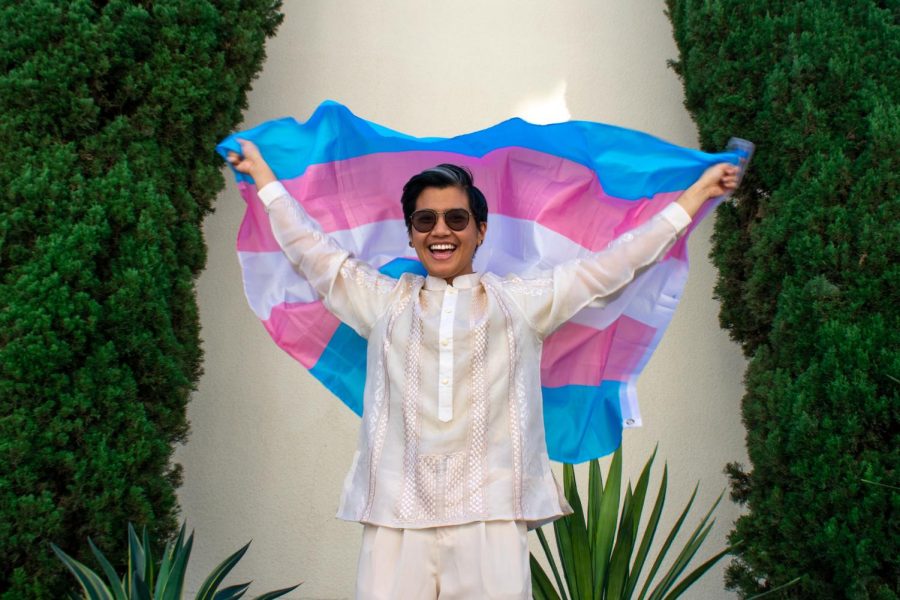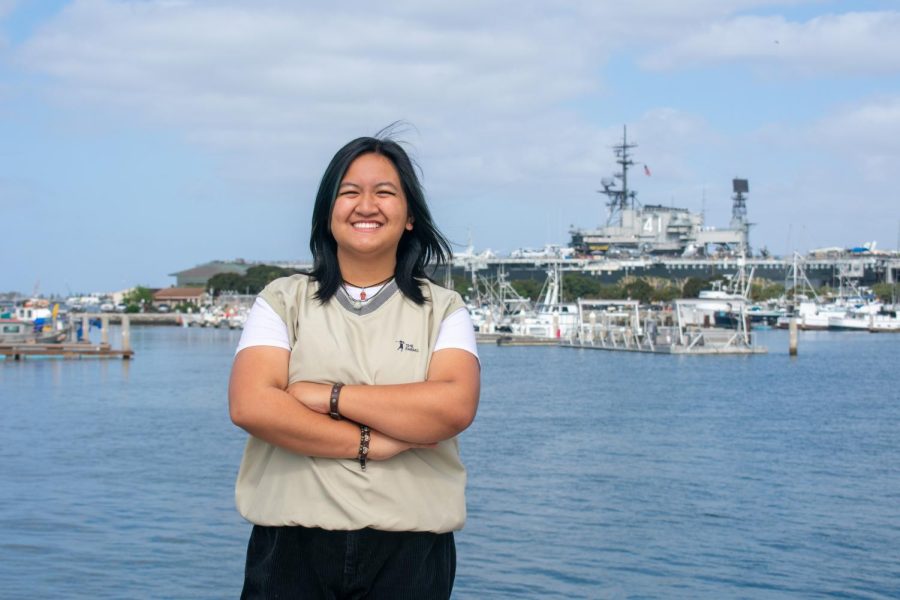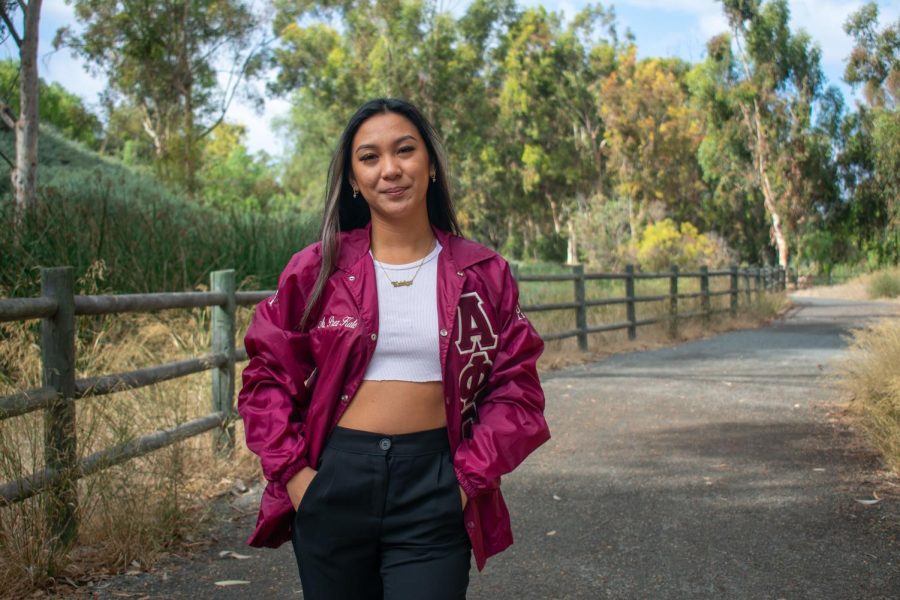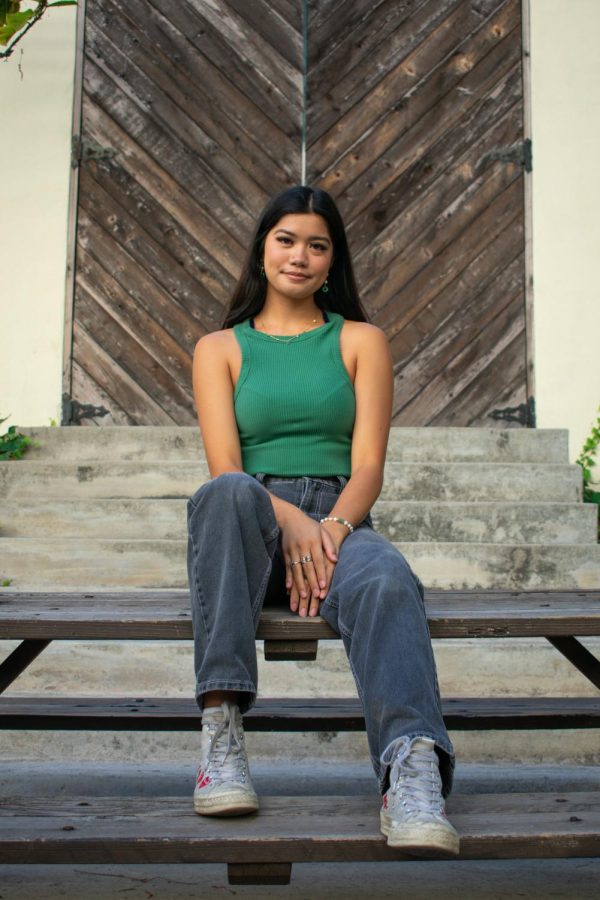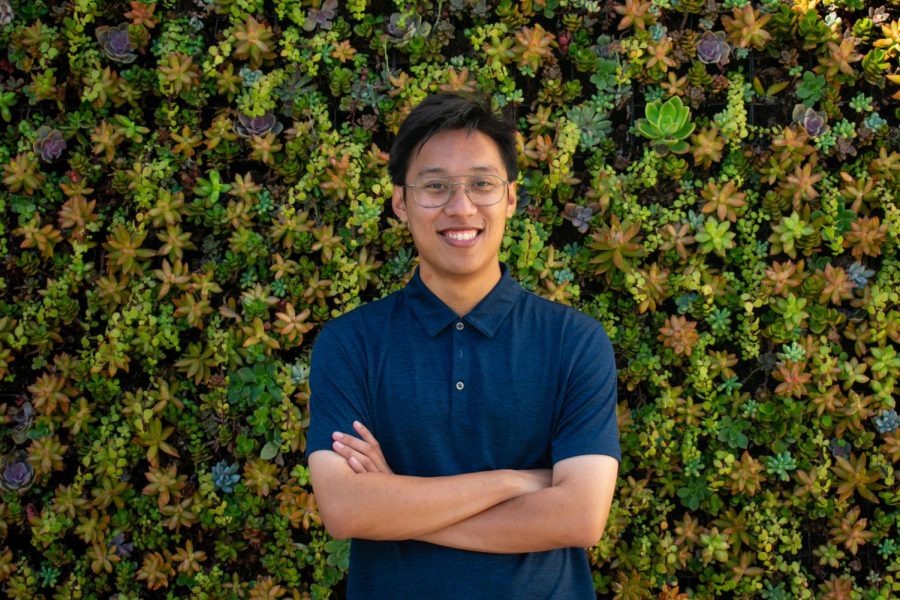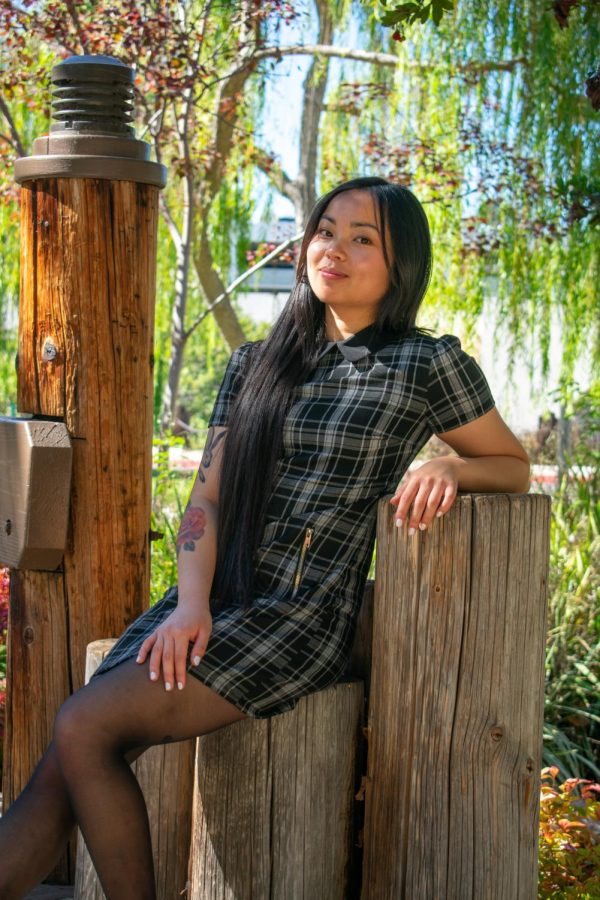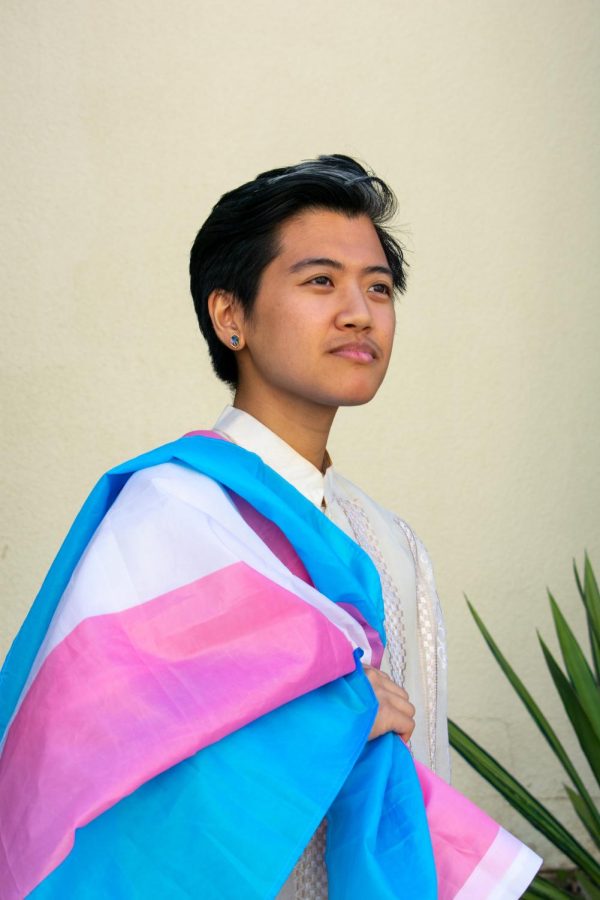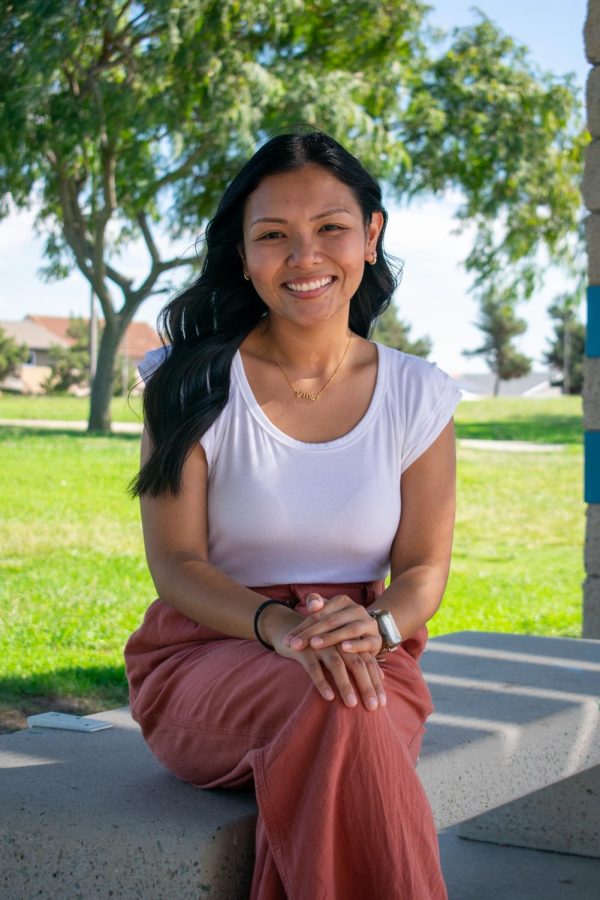Last month, I interviewed and photographed nine Filipinx student leaders at San Diego State University in eight days. I drove down to parks in Chula Vista, walked the coastline to Seaport and sat in the sand in Mission Beach, all for the perfect portrait. We talked about their childhoods, their families, their experiences growing into the leaders that they are today. The importance of representation was repeated often and they were excited to be the role models they didn’t have as young adults.
Caili Anderson
Caili Anderson is a fourth year student studying Political Science and is applying to law schools. Anderson’s leadership roles include being a mentor at the Black Resource center and the vice president of the Black Prelaw Association. She asked if we could meet at the beach to take her portraits. She didn’t hesitate to take off her shoes and feel the sand on her feet. She looked like she enjoyed every second of being there.
To her, being a leader is about advocating for one’s community and not being afraid to do what’s necessary, even though it might not be the most popular option.
The 21-year-old expressed the significance of Filipinx leadership as it relates to representation.
“As an underrepresented group, it is very important because we are a minority on campus and just with our history and being oppressed, it really is important to have leaders in our community to just uplift Filipinx voices and… share the importance of our history and our culture”.
Deanna Magpali
Deanna Magpali is 20 years old going into her fourth year. She is a Psychology major with a double minor in Counseling and Social Change as well as Child and Family Development. She lived in several places growing up in a military family, spending significant time in Japan, Washington and California. Magpali is the vice president of internal affairs for the Asian Pacific Student Alliance. Her family inspired her to get into therapy and break the cycle of family trauma.
As a leader, she takes pride in the impact she has on others. She understands that making decisions and giving advice to others comes with great responsibility.
Magpali recalled times when Filipinx leadership felt scarce when she lived in Washington and even on campus at SDSU.
“I didn’t really have that same representation…I found myself looking for that,” she said. “And so when I couldn’t find it, I just decided to be that myself.”
Katelyn Factoran
Katelyn Factoran, 22 years old, is enrolled in SDSU’s Masters Program for Educational Leadership with a specialization in Student Affairs. Factoran has held several leadership roles including president of her sorority, Alpha Phi Gamma, and vice president of diversity equity and inclusion for the Women’s Network. “Wow, I really did all of that,” she said as she looked back on the roles she held as an undergraduate. She looked proud of herself.
Leadership came naturally to her growing up as the eldest of three, consistently looking after and supporting her younger siblings. She said Filipino women are not often seen in leadership roles.
“I wanted to be the first of my family to graduate from college. I wanted to be the first of my family to show my younger siblings and my younger cousins that our parents and our grandparents immigrated here for a reason…and to make them proud and not be ashamed of having dark colored skin or having brown eyes…”
Factoran said she wants to inspire future leaders. “I hope that younger generations can be like ‘Look at her. She’s a Filipino woman and she can do all that. I can do it too,’” she said.
Alexis Bautista Maxion
Alexis Bautista Maxion is a fourth year Television, Film and New Media major with an emphasis in production. She is the student diversity commission leader for Associated Students and chairperson of Andrés Bonifacio Samahan. She said she believes that she has grown into a leader.
“I found my voice, I found a lot of my passions, and somewhere along the way I was able to develop a way of speaking up for myself and also speaking up for others. And I think that’s the main thing I really tried to carry while being a leader.”
Bautista Maxion explained the importance of leadership in Filipinx communities, emphasizing the idea of collectivism in the Philippines. People carry their ancestors’ legacy and struggles with them as they move forward. “…that’s why we carry on that leadership to really make sure that everything that we’re fighting for, whether it was imperialism, whether it was human rights and martial law…it still carries out today, even if we’re thousands and thousands of miles away from it.”
Joshua Blue Dumaua
Joshua Blue Dumaua is a fourth year Kinesiology major with an emphasis in Pre-Physical Therapy and a minor in Interdisciplinary Studies. He is the president of the Korean American Student Alliance, executive president of the Asian Pacific Student Alliance and a student office assistant for the Administration building at SDSU.
Blue Dumaua said he leads by example. When he tries something new, he shares his experience with others so they can learn from his mistakes and they feel encouraged to take on similar challenges.
“I am very transparent about my mistakes, but also about the achievements that I do accomplish,” Blue Dumaua said.
To him, the importance of leadership in the Filipinx community is having role models. He said there are more Filipinx leaders represented than when he was younger. Public figures who embrace their heritage and are proud to be Filipinx, give more people role models to look up to in the community.
When asked if there was anything else he wanted to say to end the conversation, he simply said, “I love my mom and dad.”
Sara Rose Fausto
Sara Rose Fausto is 22 years old and studying Integrated Marketing Communications. She said she is the type of person to walk into a room and take action focusing on unity and teamwork. She was president of the MiraCosta Community College International Club from 2019-20 and most recently, an APSA Music Head during spring of 2022.
During her leadership roles, Fausto learned that being a strong leader “… not only means letting others lean on you, but also knowing when you need to lean on others… No great leader can truly do it alone.” When considering the importance of Filipinx leaders, she said she believed representation of Filipinx in such roles is important, but what makes a truly good leader are their actions.
In her experience, Filipino culture is incredibly collectivist, meaning they learn to put the group’s wellbeing before their own. There is an emphasis on family values and the idea that everyone takes care of one another.
“When you have a leader who strongly believes in that, and lives by that, and implements it themself, that’s what brings others together,” she said.
Micaela Rafael
Micaela Rafael is a fourth year Mechanical Engineering student. She is the president of the Society of Women Engineers where she said she strives to inspire women in engineering to grow in their careers. Rafael said she considered herself a leader because “I strive to make a change in the environment I’m in,” she said. “I also aspire to motivate people to engage themselves in their passions, while also offering support when they need it.”
She said she believes family and humility are a large part of Filipinx culture. “…as a leader, you are in a position of high status and it’s easy to have an ego kind of take over but having humility and empathy to support the people you’re representing is really important,” she said. “Leadership is necessary in the Filipino community to guide social harmony. We know it’s not always possible, but it’s important for leaders to have, like I said, empathy and humility to help guide towards some sort of solution during chaos or discord.”
Elias Malachi Enguancho
Elias Malachi Enguancho is a fourth year Mechanical Engineering major with a Biological Engineering emphasis. He’s 21 years old and said he hopes to apply to medical school after he graduates from SDSU. Malachi Enguancho held several notable leadership roles over the years including being a peer advisor in the College of Engineering, the Academic Coordinator of the Asian Pacific Student Alliance, and serving on the board for Engineers Without Borders. He said that his Myers Briggs Personality Test accurately deemed him an Advocate.
“I have a lot of intersectionalities with my identities, being Filipino and transgender and just growing up relatively spiritual. So where I’m from, I didn’t see a lot of people who were like me,” he said. “It was a majority white area, being in Temecula. That kind of just got me to want to spread advocacy and be representative of people who can relate to me.”
When asked about the importance of Filipinx leadership, Malachi Enguancho said in the United States, Filipinos occupy many labor intensive occupations but less management roles. “Filipino leadership representation shows that our people are capable of also being managers, not just managed,” he said. “As a, hopefully, future physician, I want to show minority groups — Filipinos and the LGBTQ+ especially — that they too can lead if that’s what they want.”
Giannela Gonzales
Giannela Gonzales is a 24-year-old graduate student enrolled in the teaching credential program for elementary education at SDSU. She was born in the Philippines and moved to San Diego when she was 10 years old. Gonzales grew up next to Breen Park, the very place we met to discuss her experiences.
Her style of leadership focuses on collectivism and the idea of community members bringing each other a sense of belonging and identity. Gonzales mentioned she was inspired by the impact of being a Filipinx leader had on young students. Her students are excited to relate to someone who looks like them and speaks the same language that’s spoken in their home. Gonzales said it was hard to see herself as a leader but was grateful to be perceived as one. She said she didn’t get to experience that kind of connection when she was little. Now that she’s going into leadership, she’s grateful she can bring that to the next generation.
After taking portraits and discussing her passion for teaching, she added one final statement for future leaders.
“No matter what you look like, no matter where you come from, trust that there is a leader in you and that you can also be in these spaces in the future or now,” she said.



